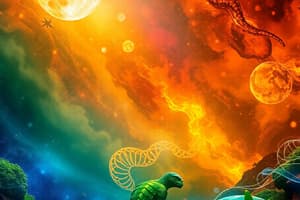Podcast
Questions and Answers
What is the primary force driving the process of evolution?
What is the primary force driving the process of evolution?
- Genetic drift
- Mutation
- Genetic recombination
- Natural selection (correct)
What is the result of natural selection acting upon genetic variations?
What is the result of natural selection acting upon genetic variations?
- Mutation
- Genetic drift
- Adaptation (correct)
- Genetic recombination
Which process introduces new genetic information into populations?
Which process introduces new genetic information into populations?
- Mutation (correct)
- Natural selection
- Genetic recombination
- Genetic drift
Which mechanism of evolution favors traits that increase survival and reproduction success?
Which mechanism of evolution favors traits that increase survival and reproduction success?
How does genetic recombination contribute to evolution?
How does genetic recombination contribute to evolution?
What leads to alterations in gene frequencies in a population without regard to fitness?
What leads to alterations in gene frequencies in a population without regard to fitness?
What did Charles Darwin propose as the driving force behind the rise and fall of species?
What did Charles Darwin propose as the driving force behind the rise and fall of species?
How do bird beaks vary according to the text?
How do bird beaks vary according to the text?
What type of adaptation allows animals to enhance their chances of avoiding predators?
What type of adaptation allows animals to enhance their chances of avoiding predators?
Which scientific discipline offers valuable insights into the origins and adaptability of life on Earth?
Which scientific discipline offers valuable insights into the origins and adaptability of life on Earth?
What has supported Charles Darwin's theory of evolution by natural selection according to the text?
What has supported Charles Darwin's theory of evolution by natural selection according to the text?
What aspect of life on Earth does the lens of evolution help us appreciate?
What aspect of life on Earth does the lens of evolution help us appreciate?
Flashcards are hidden until you start studying
Study Notes
Evolution: Biology's Key Principle
Evolution is the cornerstone of modern biology, offering insights into the diversity of life on earth and the processes that shape it. This article explores the basic tenets of evolution and delves into its subtopics, shedding light on the wondrous ways species adapt and change over time.
The Process of Evolution
At its core, evolution refers to the change in the genetic makeup of a population of organisms from one generation to the next, leading to the formation of new species. This process involves two primary forces: genetic variation and natural selection.
Genetic Variation
Variation arises from mutations, genetic recombination, and genetic drift. Mutations introduce new genetic information into populations. Genetic recombination brings together different chromosomes within a single organism, creating new combinations of genes. Lastly, genetic drift, a random process, leads to alterations in gene frequencies in a population without regard to fitness.
Natural Selection
This crucial mechanism of evolution favors advantageous traits that increase survival and reproduction success, while unfavorable ones decrease an organism's chances of passing on genes to future generations. Over time, these differences lead to the diversification of species.
Evolutionary Adaptation
Adaptation is the result of natural selection acting upon genetic variations. Organisms can exhibit various types of adaptations, including structural, behavioral, and physiological adaptations. For example, camouflaged patterns allow animals to blend with their surroundings, enhancing their chances of avoiding predators. Similarly, bird beaks vary in size and shape, reflecting the type of food each species consumes, thereby optimizing their feeding efficiency.
Evolution and the Origin of Species
Charles Darwin proposed that species arise and go extinct due to a slow, gradual process driven by natural selection. His theory of evolution by natural selection has been supported through numerous discoveries, particularly in the context of DNA sequencing and the elucidation of the mechanisms driving genetic variation.
In summary, evolution is a fascinating, multifaceted discipline within biology that offers valuable insights into the origins and adaptability of life on Earth. Through the lens of evolution, we can better appreciate the interconnectedness of species and the continuous process of change that shapes our world.
Studying That Suits You
Use AI to generate personalized quizzes and flashcards to suit your learning preferences.





